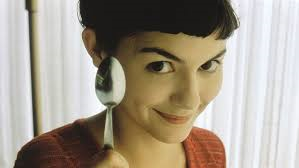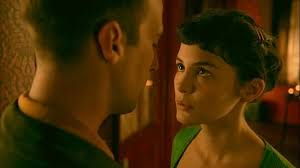More to Life: Asexuality in Amelie
One of my friends is asexual, which has made for some interesting conversations – I have gotten a few questions about being poly, while my friend has been open and honest in responses regarding questions about their orientation (yes, it’s a valid orientation. No one’s broken or deficient.). One of the points made clear was that while sexual attraction isn’t experienced, their life isn’t totally devoid of pleasure – in fact, it’s the little things that provide a sensory thrill. My mind immediately jumped to Jean-Pierre Jeunet’s 2001 film Le Fabuleux Destin d’Amelie Poulain (Amelie), a film that holds such a high place in my heart for its humor, emotion and pure whimsy with nary a hint of saccharine overkill. One scene in particular – the one in which Amelie (Audrey Tautou) holds in a giggle while an unnamed man has sex with her – jumped into my memory during conversation. That got me thinking… could this character (and the overall film) be asexual? And could this provide a message that asexuality – or even a de-emphasized approach to sex – can lead to greater life satisfaction?

Not just sex, but real intimacy.
Let’s back up for a minute and explore asexuality before we tackle the film. Asexuality is a sexual orientation wherein the individual either does not experience sexual attraction or has a pretty low desire for sexual activity. It’s not the same thing as celibacy, which is a conscious choice to avoid all sexual activity – that’s suppression of desire, which an asexual simply doesn’t have. There are varying levels of asexuality: some don’t experience romantic inclinations toward anyone (those folks are known as aromantics), while others identify as bi-, hetero-, pan- or homoromantic. The key word there is – you guessed it – “romantic.” That’s right: many asexuals (or aces) still fall in love, despite that they have no desire to bang someone like a screen door in a hurricane. For most, that’s a confusing notion, because for the bulk of us out there, we fall in love and our bathing suit areas suddenly decide that it’s time to party; hell, we see one picture of Justin Trudeau, and there’s a party in everyone’s pants. Except for our ace friends, who feel the same way about cake as I do about multiple orgasms. Some enter into relationships with other asexuals; others prefer to fly solo; some masturbate the same way you’d scratch an itch on your leg; some engage in sex because it’s a point of curiosity or, sadly, social pressure; some enjoy cuddling and display affection with others; still others fall for non-asexuals and come to agreements in their marriage and/or partnerships, such as open marriage or an arrangement for sexual activity. It all depends upon the person, and at the end of the day, you don’t have to completely get it – you just have to not be a complete asshole by demanding private information from someone or degrading someone’s sexual identity. (Quick note: if you want more information, I highly suggest bopping on over to The Asexuality Visibility and Education Network [AVEN], which has some excellent resources with which you may educate yourself further than my bare-bones intro.)

We love you, ace readers.
So, back to Amelie. The scene in question – the sex scene between Amelie and a nameless, faceless partner – doesn’t even get fully relayed by our titular heroine, suggesting that it means far more to the narrator than it does to her. “Amelie has no boyfriend,” the narrator explains. “She tried once or twice, but the results were a letdown.” Mind you, we don’t get to see Amelie getting disappointed over a movie date gone wrong or her boyfriend dissing her cooking – we see her as she’s pursing her lips and trying to hold in a laugh while he’s having sex with her. The focus of disappointment isn’t the emotional connection or the search for a kindred spirit: it’s placed firmly on the sexual expectation of a relationship. Her suppressed giggle is effective: sex, to Amelie, is a bit of a joke (can’t blame her there – have you seen the faces or heard the noises some people make?). This silliness extends itself into her imaginative inner monologue, in which she asks herself, “How many couples are having an orgasm right now?” After a series of multiple couples shouting incoherently in various states of undress and positions, we get a quick shot of Amelie smirking and answering, “Fifteen.” This is meant to be funny – we’re supposed to laugh at the noise and the asses bobbing and the tits hanging out and the goofy expressions on everyone’s faces. In an instant, sex goes from something that drives the actions of so many of us to something that makes you look completely ridiculous. Your orgasm is her giggle fit.

Don’t laugh out loud, don’t laugh out loud…
And so our narrator continues, “Instead, she cultivates a taste for small pleasures: dipping her hand into sacks of grain, cracking crème brulee with a teaspoon, and skipping stones at St. Martin’s Canal.” The contrast here is subtle yet clear: she gets far more pleasure out of non-sexual sensory experiences than she does out of the act of sexual intercourse. Feeling grain against her hands is better than sex. This is actually a sentiment I’ve heard echoed from my ace friend, who described both eating and resting their hands on the hips of another person to be immensely satisfying experiences. While that’s anecdotal, consider this: just about every character in this film is set up with a series of likes associated with physical sensation. Roll call:
- Amelie’s father – peeling large strips of wallpaper, lining up and shining his shoes, emptying/cleaning his toolbox
- Amelie’s mother – figure skaters’ costumes, polishing the parquet with her feet, emptying/cleaning her handbag
- Gina – cracking bones
- Joseph – popping bubble wrap
- Philomene – the sound of the cat’s bowl on the tiles
- The cat – overhearing children’s stories
- Amelie – looking back at the faces of other patrons at the movie theatre, finding minute movie details
- Bretodeau – loves to roast a chicken, then pick the carcass and eat it

Simple pleasures.
These are arguably the idiosyncrasies of a person – the little things that make you love someone all the more, the tiny details of what makes the person them. However, it’s worth noting that we’re not given much in the way of sexual preference with most of these characters. No one is sitting around swapping sex stories, not even Nino, who works in a goddamned porn shop. No, these people are all quietly focused on their own lives and interests, and their search is for someone who understands them. The counter-point to this is the example of Georgette and Joseph, who strike up a romantic relationship. However, it’s worth noting that even then, we’re supposed to find sex between this pair funny: we see the glasses shake as they have sex in the restroom, with Amelie releasing the steam of the coffee machine to hide Georgette’s exaggerated cries. Rather, it’s the moments of learning the small details of the physical sensations that someone likes that provide true intimacy into the psyche of each character. It’s so much more vulnerable to learn the little pieces than to watch them fuck. Thus, we’re granted a special window into their lives, which gives us a chance to truly fall in love. In this respect, removing the sexual aspect brings us closer to the characters. It ultimately grants us the ability to see the person without the cloud of sexual attraction to overload common sense. We see the individual, not the person we’d like to screw. At the end of the day, isn’t that really the person with which you’d like to spend the rest of your life?

These are the moments that really make a relationship, not the sex.
Which brings us to another point: while it’s tempting to romanticize the asexuality of these characters, Jeunet steers clear of fetishizing the lack of sex drive. Amelie and Nino don’t outwardly crave sex in this film, but their lives are painted as isolated, painful and lonely. Both grow up without friends and live in worlds dominated by fantasy and self-imposed solitude. When given the chance to confront one another and begin an honest relationship, both take multiple tries to face one another. In fact, when Amelie answers the door at the end of the film, no words are exchanged with Nino, which could mean one of two things: their love knows no language, or these two still can’t find a way to communicate verbally. It’s the relationship version of the glass being half empty or half full: depending upon your attitudes and supporting evidence, this relationship is either touching or doomed. Either way, Jeunet makes a point to present both the heartache of their lives along with the whimsy and clarity. It’s not a solution to finding lasting love – in a very real sense, Amelie and Nino still have to address their feelings of personal connection and dedication to a hyper imagination in order to move forward. They’re just not sorting through their feelings while also trying to figure out if the connection is only physical.

I love that no one jumped anyone here.
Therein lies the main conundrum of this film: should we applaud these two for finding a love that transcends the bounds of sexual tension, or should we shake our heads that in the end, Amelie and Nino have to consummate their relationship physically in order to cement it? Here’s where I’m going to go out on a limb and offer a bit of both column A and column B: Amelie and Nino get to dictate the parameters of their relationship regardless of sexual orientation, outside of the boundaries of heteronormative sexual tension that most couples face. For some ace folks, a relationship means that sex will happen from time to time; for others, it won’t. That doesn’t make them any more or less asexual; it means they’re adults in relationships on their own terms. To a certain extent, though, I can see where some would feel upset: if sex didn’t drive the whole thing, why are they screwing at all? Why can’t they just enjoy their time together without the pressure of sex, which obviously doesn’t work for the female lead? That sends the message that all an asexual needs is a good roll in the hay with the right person, which isn’t how it works. It’s conforming to movie conventions in the name of pleasing the audience. While it’s frustrating that Jeunet felt the need to throw his leads into bed at the end, consider this: we see their first kiss as a series of soft, intimate explorations: a kiss above the lip, a kiss on the neck, then a kiss on the eye. Even when they do kiss, we see silhouettes, not full-on, gratuitous face-sucking. We don’t see an explicit sex scene – we see the end result of the pair cuddled in bed together, Nino with his head over Amelie’s heart as she strokes his hair. It’s a moving image of contentment, one that is far more emotional than sexual. There’s no frenzy – just a young couple in love, being close to one another physically. Jeunet is content to let us see that aspect of the couple rather than the graphic physical piece, and in some respects, it removes the stigma from an ace individual who does engage in the act of sex from time to time. It’s not black and white, and while it takes some time to reconcile that, in the end, I think that’s an inclusive statement on a population that tends to suffer from people who wish to pigeonhole their identities.

Love the focus on the feeling rather than the act.
In the end, I very well could receive a dozen letters from the makers of this film explaining that I’ve read way too far into this. However, I like to entertain the notion that a romantic comedy from 2001 was busy exploring the facet of love that doesn’t require sex and doesn’t get the exposure and sensitivity it should. It didn’t seek to place it on a pedestal when it could have, choosing instead to present the pros and the cons. I feel this does the ace community a far greater service: it normalizes without coating the experience in sugary, one-sided benefit. Sometimes, we need to recognize that love stories are more than just the lead-up to sex; sometimes, it’s nuzzling into the neck of someone you care about in the moment, without caring about the steps it’s going to take to get to the bedroom. Sometimes, the best love and most living we experience has nothing to do with bodily fluids. And that’s okay.
